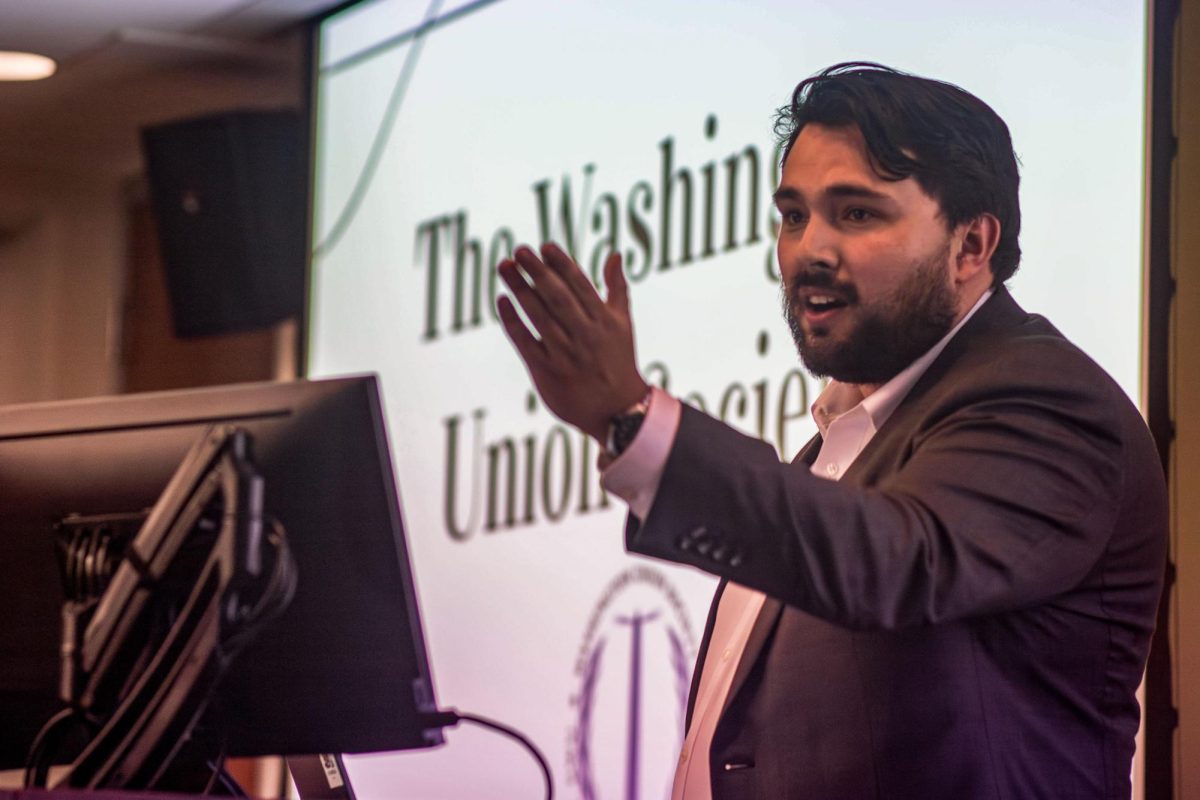The Washington Union Society, a GW student debate organization, discussed whether the global age of democracy is over at the Elliott School of International Affairs on Thursday.
The WUS — an organization established by a group of students this fall that hosts debates over a wide variety of topics from politics to pop culture — held a British Parliamentary-style debate about the statement, “This House believes the age of democracy is over.” The debaters comprised of four students, Washington Post columnist Shadi Hamid and the New York Times columnist and political commentator Jamelle Bouie.
Pavel Oman, president of the WUS, said the society’s mission is to host events where students and political, academic and pop culture leaders can freely debate controversies.
Hamid kicked off the debate arguing in opposition to the motion. He said in 1945, only eight percent of nations in the world were democracies, which grew to 54 percent during the post-World War II period. He said while the percentage is below 50 percent today, it would be “overly alarmist” to consider the statistic a global failure in democracy considering historic levels.
“To me, it shows that even in the seemingly worst of times, democracy is still resilient,” Hamid said.
Hamid said the United States is currently facing an attack on liberalism, rather than democracy, because people are debating personal freedoms, not levels of representation in government.
Hamid said America’s constitution empowers a “co-equal” judicial branch to uphold democracy’s resilience, which has been shown in the judicial system pushing back against Trump’s deportation of noncitizens.
Hamid said autocratic governments are “inherently weak,” likely to collapse quickly and are only successful in small populations that have vast oil wealth.
“If American democracy is so weak that it can’t withstand Donald Trump, then it wasn’t really much of a democracy to begin with,” Hamid said. “If we look at our 250-year history, this isn’t the first time we face such challenges and such tests.”
Ernesto Estela, who argued in proposition, said the nation is facing a death of democracy. He said America has stopped advocating as heavily for democracy in other nations, which represents American national instability and the discontinuation of a global democratic order.
He said America was the “vanguard of liberal democracy” and its internal instability removes incentives for other countries to lean towards democracy as the most powerful democracy in the world is no longer a model and has veered away from the democratic way. Estela asked why Peru should seek a democracy when America, the most iconic democracy on earth, does not care about themselves.
“But like with every empire, the golden age of this one-tax Americana is quickly slipping away in its pursuit of power,” Estela said.
Guest speaker Jamelle Bouie, debating in the opposition, said during historic events like the Great Depression and Civil War, commentators argued democracy was dead, only to be proven wrong as the country rebounded from the war and democracy persisted.
Bouie said democracy is a resilient “set of values,” and that despite the rise of authoritarian leaders, its still one of the most potent — even dangerous — forces in history, with the ability to overthrow empires and spark revolutions.
“I think that in a country such as ours, where democracy is our birthright, there is no question that tens of millions of us, at the least, will struggle to protect and sustain it as best as we can,” Bouie said.
Oman was the final speaker of the debate. He cited Cicero, who said dangers from within a nation can be a stronger threat than outsiders. He said we can see the dying nature of democracy internationally through the declining ratings on The Economist’s Democracy Index and political unrest in South Korea, Turkey and Georgia.
“Constitutions are merely ink on paper. They cannot defend themselves,” Oman said. “They must be upheld by those with power, those who act virtuously when they could otherwise act expediently.”
Oman said “all that lives must die,” referring the inevitable end to either Trump’s rule or his life. He said after Trump’s term, America can rebuild a more free and safer foundation for the greater future.
“Our view to future generations is to win this struggle,” Oman said. “As we go forward from this meeting, we must prepare to be prepared to build, we must prepare to build a new world, a new age of democracy.”





